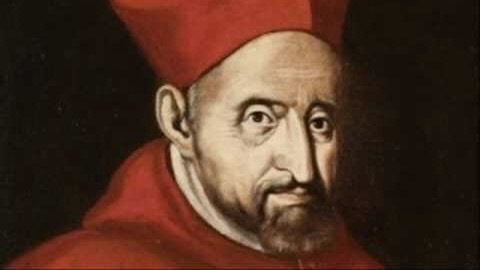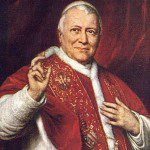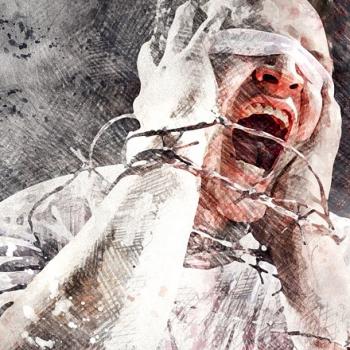
St. Robert Bellarmine
I have argued before that a pope can not be a heretic. There is nothing that makes it theoretically impossible; the Holy Spirit only protects the pope from binding Catholics to heresy. But it seems to me that the safest way for the Holy Spirit do to this is simply to ensure that no one who is a heretic, or who could become a heretic, would ever be elected pope. The other option, I guess, would be that the Holy Spirit could strike the pope down with a stroke or a heart attack just before the fatal moment when any such binding were to occur. These are extravagant speculations. The belief that a pope could not ever be a heretic is “probable,” according to Bellarmine, and “can easily be defended,” even though it is “not certain.”
Now, in Book II, chapter 30 of De Romano Pontafice, Bellarmine is engaging in theological speculation. It is important to know that. He is not making a definite pronouncement as to what in fact would happen if a pope were to be a heretic. Only the Church could do such a thing, and the Church has not done so. Bellarmine was a cardinal, of course, but he was not making a ruling on behalf of the Church.
The reason I say this is because it has been misunderstood. Even Cardinal Burke, in an interview with Catholic World Report, said that if a pope were to “formally profess” heresy, he would cease to be pope.
CWR: Some people are saying that the pope could separate himself from communion with the Church. Can the pope legitimately be declared in schism or heresy?
Cardinal Burke: If a Pope would formally profess heresy he would cease, by that act, to be the Pope. It’s automatic. And so, that could happen.
CWR: That could happen.
Cardinal Burke: Yes.
Cardinal Burke is wrong on two points here.
- Whether a pope could be a heretic, a pope can not possibly “formally profess heresy.” The Church has taught this dogmatically.
- The speculations of Bellarmine (and also Suarez) were just that. It is wrong for Burke to treat them as though they constitute existing canon law.
On this first point, consider Pastor Aeternus:
We teach and define that it is a divinely-revealed dogma: that the Roman Pontiff, when he speaks ex Cathedra, that is, when in discharge of the office of Pastor and Teacher of all Christians, by virtue of his supreme Apostolic authority, he defines a doctrine regarding faith or morals to be held by the Universal Church, by the divine assistance promised to him in blessed Peter, is possessed of that infallibility with which the divine Redeemer willed that His Church should be endowed for defining doctrine regarding faith or morals: and that therefore such definitions of the Roman Pontiff are irreformable of themselves, and not from the consent of the Church.
Burke can not use the “that’s not dogmatic” line on Pastor Aeternus like he did with Nostra Aetate. The Vatican I document says flat-out: This is a dogma. The pope can not formally profess heresy. He is protected from it by the Holy Spirit.
On the second point, there is simply no provision in canon law that says what Burke claims. Given that Vatican I says a pope can not “formally profess” heresy, if a pope did, that would mean Vatican I taught heresy, which would mean Pius IX had ceased to be pope, which would mean all the popes after him that have accepted Vatican I were also not ever popes, which means Burke is not even a valid Cardinal, he doesn’t have valid holy orders, and there is no Catholic Church.
But even if we were to be faced with a pope who was a heretic, even if he had not taught heresy, there is no provision in canon law for what to do about it. Someone would have to have the authority to judge whether a pope was in heresy, and someone would have to have the authority to remove him so that a conclave could elect a new pope. (Possibly Cardinal Burke himself.)
Canon law says nothing like this. In fact, it says the opposite. Canon 1404 says: “The First See is judged by no one.” Not by me, not by you, not by 1 Luther 5 or LSD News, and not by Cardinal Burke. Not even a Council can depose a pope. (The Third Council of Constantinople was pronouncing a judgment on a former pope when it condemned the dead Honorius I.)
Another important point to make in this context is that the Council of Constance (1415) condemned a few heretical ideas of Jan Hus, and one of them was the idea that a wicked pope would cease to be pope. In article 20, the Council condemns the following as
heresy:
If the pope is wicked, and especially if he is foreknown to damnation, then he is a devil like Judas the apostle, a thief and a son of perdition and is not the head of the holy church militant since he is not even a member of it.
If Hus was wrong in saying that a wicked pope would cease to be pope, would it not likewise be wrong to say that a heretic pope would cease to be pope?
***
The Church has not said. And that’s where we return to Bellarmine. Bellarmine himself believed a pope could not be a heretic. He speculated as a theological exercise in light of the truth that no one knows if a pope could actually be a heretic or not. So what if?
Bellarmine walks the reader through five different opinions on the question, one by one detailing the inadequacies. His view was that a pope who was a “manifest heretic” would automatically cease to be a pope—he would even cease to be a Christian—and could then be judged by the Church. He cites some authorities to show how this is true with heretics in a general way, but does not address some important questions.
- Who would have the authority to decide the pope was a “manifest heretic”?
- What canonical process would depose such a pope?
Bellarmine rejects Cajetan’s view that a pope could be deposed, since there is no authority higher than the pope’s. This seems right, but the idea that a pope is deposed latae sententiae also fails, in my view, since Bellarmine never considers how the Church would know that a pope had ceased to be pope. The electors would need to choose a new one. How would they know to gather in conclave? What if the pope resisted? Bellarmine concedes that to be a problem with a deposition. But even a latae sententiae deposition is a deposition.
But the fact is, Bellarmine is speculating. There is no provision in canon law that addresses this question.
A pope can not teach heresy. But what if a pope were a heretic? What would happen?
As near as I can tell: Nothing.











